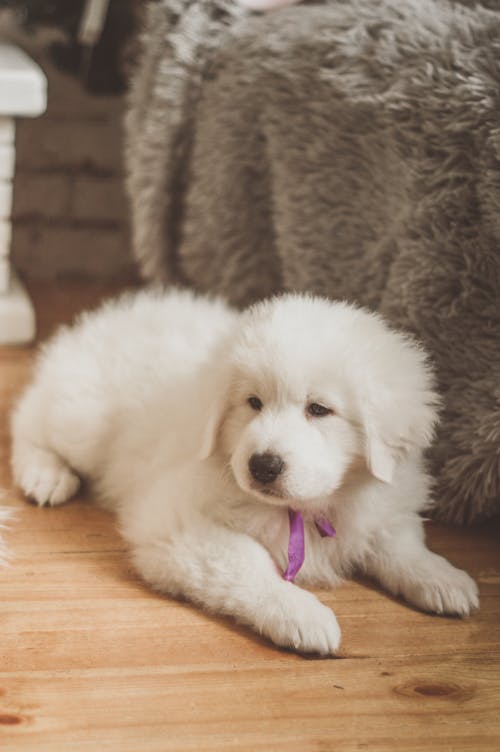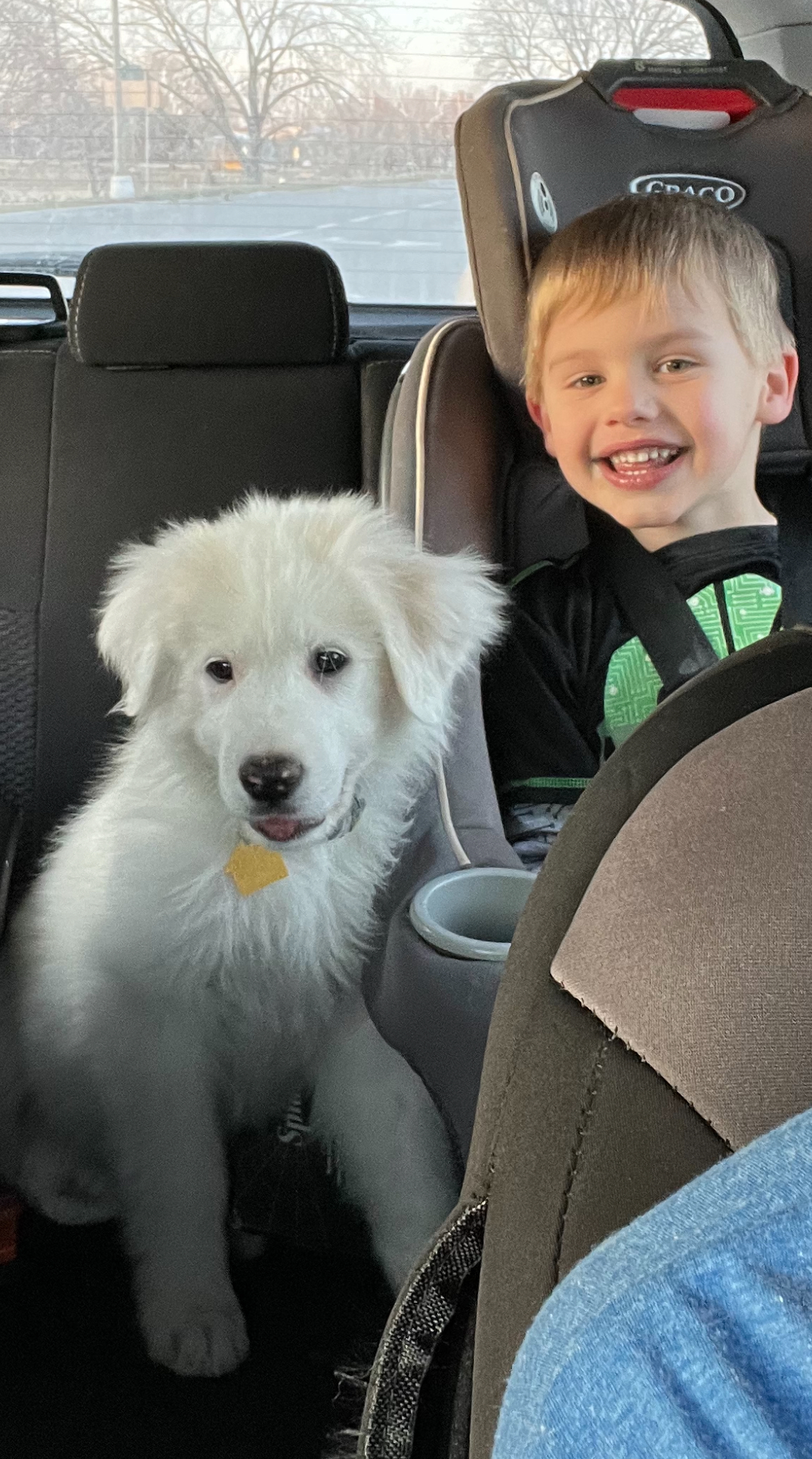Hey there! Some links on this page are affiliate links for Amazon which means that as an Amazon associate, if you choose to make a purchase, I may earn a small comission at no extra cost to you. Thank you so much again for just checking out this page. 🙂

Great Pyrenees puppies are one of the most adorable and majestic breeds out there. These fluffy white creatures are known for their loyalty, intelligence, and protectiveness. If you’re considering adopting a Great Pyrenees puppy, there are a few things you should know beforehand.
In this article, we’ll cover everything you need to know about Great Pyrenees puppies. Temperament and Personality Great Pyrenees puppies have a calm and gentle temperament, but they are also very independent. They were originally bred to guard livestock, and as a result, they are instinctively protective of their family and territory. They are very loyal and affectionate with their owners, but can be reserved with strangers.
Socialization is key with this breed, as they can become fearful or aggressive if not properly socialized. Training a Great Pyrenees puppy can be a bit of a challenge, as they have a stubborn streak. It’s important to start training early and be consistent with your commands. Positive reinforcement is the best approach, as these dogs respond well to praise and treats. Our Dolly is SO SWEET, but there are times when she doesn’t listen. It’s important to not spank and use plenty of positive reinforcement when this happens. It’s also important to establish yourself as the pack leader, as Great Pyrenees puppies can be dominant if not properly trained.
One thing to keep in mind when training a Great Pyrenees puppy is that they have a strong prey drive. They were bred to guard livestock, but also to protect them from predators. As a result, they may chase after small animals like squirrels or rabbits. It’s important to teach them to control their impulse to chase, as this can lead to dangerous situations.
Exercise and Grooming
Great Pyrenees puppies are a large breed, and they require plenty of exercise to stay healthy and happy. Daily walks and playtime in a fenced yard are essential. They also love to run and play, so taking them to a dog park is a great way to burn off some energy. As for grooming, Great Pyrenees puppies have a thick double coat that requires regular brushing to prevent matting and tangling. They shed heavily twice a year, so be prepared to do some extra cleaning during those times.
When it comes to exercise, it’s important to keep in mind that Great Pyrenees puppies grow quickly. They are a large breed, and their bones and joints are still developing. It’s important not to over-exercise them or allow them to jump from high surfaces, as this can cause joint problems later in life. It’s also important to keep them at a healthy weight, as excess weight can put extra strain on their joints.
Health and Nutrition
Great Pyrenees puppies are generally healthy dogs, but like all breeds, they can be prone to certain health issues. Hip dysplasia, bloat, and eye problems are some of the most common health concerns with this breed. It’s important to feed your Great Pyrenees puppy a high-quality diet like Merricks, that is appropriate for their size and age. Talk to your veterinarian about the best food options for your puppy. When it comes to health issues, it’s important to keep an eye out for any signs of discomfort or pain. Great Pyrenees puppies are stoic animals, and they may not show signs of pain until it’s severe. It’s important to take them to the vet for regular check-ups and to keep up with their vaccinations and preventative care.
Adoption and Rescue
If you’re considering adopting a Great Pyrenees puppy, there are many reputable breeders out there. However, you may also want to consider adopting from a rescue organization. There are many Great Pyrenees rescue groups that work to find homes for abandoned and neglected dogs. Adopting a rescue dog can be a rewarding experience and can save a life. When adopting a Great Pyrenees puppy, it’s important to do your research and find a reputable breeder or rescue organization. Look for breeders who are registered with the American Kennel Club and who have a good reputation in the community.
If adopting from a rescue group, make sure they are a reputable organization and that they have properly vetted the dog before placing them in a home. In conclusion, Great Pyrenees puppies are a wonderful breed, but they require a lot of love, attention, and training. If you’re willing to put in the time and effort, you’ll be rewarded with a loyal and loving companion that will protect and cherish you for years to come. With proper socialization, training, exercise, and nutrition, your Great Pyrenees puppy will be a happy and healthy member of your family. The bottom line is that you socialize him/her as often as you can and that you get a professional dog trainer to help you have a well behaved giant breed. 🙂
Common FAQ’s
- What do I need to know before adopting a Great Pyrenees?
Before adopting a Great Pyrenees, you should know that they are a large breed and require plenty of exercise and space to roam. They are also independent and can be stubborn, so training and socialization are important. They have a strong prey drive and may chase small animals, so it’s important to teach them to control this impulse. Great Pyrenees puppies also have a thick double coat that requires regular grooming and they shed heavily twice a year. It’s important to be aware of potential health issues, such as hip dysplasia and bloat, and to feed them a high-quality diet appropriate for their size and age.
2. What to look for when buying a Great Pyrenees puppy?
When buying a Great Pyrenees puppy, it’s important to find a reputable breeder who is registered with the American Kennel Club and has a good reputation in the community. Look for breeders who health test their dogs and can provide you with documentation of the puppy’s health and lineage. It’s also important to meet the puppy’s parents and see where they live to get an idea of their temperament and living conditions. Look for a puppy that is alert, active, and friendly.
3. What do I need to know about raising a Great Pyrenees puppy?
Raising a Great Pyrenees puppy requires patience, consistency, and plenty of socialization and training. They are independent and can be stubborn, so it’s important to establish yourself as the pack leader early on. Positive reinforcement methods are the best approach, as they respond well to praise and treats. Regular exercise is important to keep them healthy and happy, but it’s important not to over-exercise them or allow them to jump from high surfaces to prevent joint problems later in life. They also require regular grooming to prevent matting and tangling of their thick double coat.
4. Are Great Pyrenees good for first-time owners?
Great Pyrenees can make good pets for first-time owners, but they require a lot of attention, training, and socialization. They are a large breed and may not be suitable for those living in small apartments or without a yard. They are also independent and can be stubborn, so patience and consistency are important. It’s important to do your research and make sure you are prepared to meet their needs before bringing a Great Pyrenees puppy into your home.
